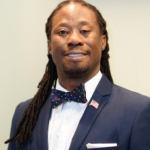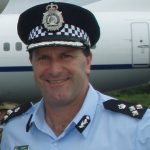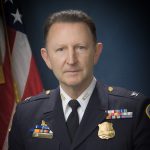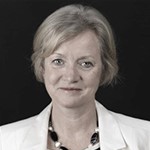 Oscar Alleyne is Senior Advisor for Public Health Programs at the National Association of County and City Health Officials providing leadership and senior level management of a portfolio of $14 million covering the programmatic divisions of Infectious Disease and Informatics, Public Health Preparedness, Pandemic and Catastrophic Preparedness, and Environmental Health. Dr. Alleyne began his career in governmental public health and for 15 years served as the Director of Epidemiology and Public Health in Rockland County. He holds a Doctorate in Public Health from the New York Medical College, School of Health Sciences and Practice and is a graduate of the University at Albany, School of Public Health.
Oscar Alleyne is Senior Advisor for Public Health Programs at the National Association of County and City Health Officials providing leadership and senior level management of a portfolio of $14 million covering the programmatic divisions of Infectious Disease and Informatics, Public Health Preparedness, Pandemic and Catastrophic Preparedness, and Environmental Health. Dr. Alleyne began his career in governmental public health and for 15 years served as the Director of Epidemiology and Public Health in Rockland County. He holds a Doctorate in Public Health from the New York Medical College, School of Health Sciences and Practice and is a graduate of the University at Albany, School of Public Health.
 Dr. Annette Bailey is Associate Professor with the Daphne Cockwell School of Nursing, Ryerson University. She holds a PhD in Public Health Science. He research explores gun violence survivorship. Much of her research work is focused on understanding the grief and trauma experiences of adults and youth survivors of gun homicide. Dr. Bailey has explored the experiences of Black mothers who lost children to gun violence; as well as youth who lost friends and siblings to gun homicide in Toronto. She has conducted a comprehensive key informant assessment with stakeholders across Canada to establish Canadian-specific evidence for policy development for gun violence survivors. She has established key collaboration with academics, community stakeholders, and policy makers in several countries, who are working to address gun violence. Her work has been disseminated widely through peer- reviewed journals, book chapters, international conferences, and within local community organizations, provincial government agencies, and in the Canadian House of Commons. Her research work was recommended by a Member of Parliament for informing Bill C-32, the Victims Bill of Rights.
Dr. Annette Bailey is Associate Professor with the Daphne Cockwell School of Nursing, Ryerson University. She holds a PhD in Public Health Science. He research explores gun violence survivorship. Much of her research work is focused on understanding the grief and trauma experiences of adults and youth survivors of gun homicide. Dr. Bailey has explored the experiences of Black mothers who lost children to gun violence; as well as youth who lost friends and siblings to gun homicide in Toronto. She has conducted a comprehensive key informant assessment with stakeholders across Canada to establish Canadian-specific evidence for policy development for gun violence survivors. She has established key collaboration with academics, community stakeholders, and policy makers in several countries, who are working to address gun violence. Her work has been disseminated widely through peer- reviewed journals, book chapters, international conferences, and within local community organizations, provincial government agencies, and in the Canadian House of Commons. Her research work was recommended by a Member of Parliament for informing Bill C-32, the Victims Bill of Rights.
 Justice Kofi N. Barnes is a judge of the Ontario Superior Court of Justice. He is a former judge of the Ontario Court of Justice. Justice Barnes was admitted to the Ontario Bar in 1993. Prior to his judicial career, he was a Deputy Director of the Federal Prosecution Service (Public Prosecution Service of Canada).
Justice Kofi N. Barnes is a judge of the Ontario Superior Court of Justice. He is a former judge of the Ontario Court of Justice. Justice Barnes was admitted to the Ontario Bar in 1993. Prior to his judicial career, he was a Deputy Director of the Federal Prosecution Service (Public Prosecution Service of Canada).
Justice Barnes is known as a pioneer and innovator in therapeutic jurisprudence and a champion of social justice. Justice Barnes came to Canada from Ghana and attended Trent University and then Osgoode Hall Law School at York University.
Justice Barnes is the founder of the Metro West Youth Community Restoration Court; the Durham Mental Health and Drug Treatment Court and co-founder of Canada’s first Drug Treatment Court. For more information click this link: https://youtu.be/tuGP6gU9CvM.
Justice Barnes is the founding president of the not-for-profit organization Canadian Association of Drug Treatment Court Professionals and president of the International Association of Drug Treatment Courts. In addition, to his regular judicial duties, Justice Barnes has provided training sessions on solution focused strategies and innovative approaches to justice. He is a co-author of People Places and Things – Inspirational Stories from Canada’s Drug Treatment Courts – published by Friesen Press.
Barnes is the recipient of many awards including the Queen Elizabeth Silver Jubilee Commemorative medal, Trent University Distinguished Alumni Award, the Bryden Awards and the African-Canadian Achievement Awards for Excellence in Law.
 Shannon Cosgrove serves as Director of Health Policy at Cure Violence where she is responsible for staffing the Movement towards Violence as a Health Issue that is chaired by Dr. Satcher, former US Surgeon General; Dr. Sommer, former Dean of the Johns Hopkins Bloomberg School of Public Health and Dr. Slutkin, Founder/CEO of Cure Violence. In this role, she oversees public education; developing and implementing a heath approach framework and identifies policies to promote and sustain the work with an equity lens.
Shannon Cosgrove serves as Director of Health Policy at Cure Violence where she is responsible for staffing the Movement towards Violence as a Health Issue that is chaired by Dr. Satcher, former US Surgeon General; Dr. Sommer, former Dean of the Johns Hopkins Bloomberg School of Public Health and Dr. Slutkin, Founder/CEO of Cure Violence. In this role, she oversees public education; developing and implementing a heath approach framework and identifies policies to promote and sustain the work with an equity lens.
Shannon is a member of the Place Matters for Health Equity Community, an expert in the Allies for Reaching Community Health Equity Network of Global Policy Solutions and is undergoing certification to deliver the Equity, Diversity and Inclusion training with CommonHealth ACTION.
Previously, Shannon served as the Deputy Director for the Mayor’s Office on Criminal Justice in Baltimore City. Her past roles include: Health Equity Manager on the Healthier Communities Team at YMCA of the USA, Project Officer at the Centers for Disease Control and Prevention’s Racial and Ethnic Approaches to Community Health team and Health Disparities Coordinator at the Baltimore City Health Department through the Centers for Disease Control and Prevention’s Public Health Prevention Fellowship Program where she also served as the Chair of the Health Equity and Social Justice Committee.
While receiving her MHA and BSc in Health Policy and Administration from the Pennsylvania State University, Shannon served as a peer behavioral interventionist and as the grant coordinator at the Centre for Volunteers in Medicine. Ms. Cosgrove recently relocated with her family to Oakland, CA.
 Commander Edwards possesses over 33 years of policing experience at the local, national and international level. He has worked in the transnational crime areas of counter terrorism, international organised crime, drug trafficking, people smuggling, human trafficking, Child Exploitation and Cyber Crime.
Commander Edwards possesses over 33 years of policing experience at the local, national and international level. He has worked in the transnational crime areas of counter terrorism, international organised crime, drug trafficking, people smuggling, human trafficking, Child Exploitation and Cyber Crime.
Commander Edwards has previously been posted internationally as Liaison Officer Los Angeles, to Timor-Leste as the Commander Timor-Leste Police Development Program and Security Advisor to the Timor-Leste Secretary of State for Security. He also served in Afghanistan as the AFP Commander Afghanistan Mission and Deputy Head of the International Police Coordination Board.
Grant is presently the Manager Americas based in Washington DC and responsible for liaison within Canada, USA, Mexico, the Caribbean, Central America and South America.
Prior to taking up his current assignment, Grant was the AFP’s Aviation Commander for Queensland, encompassing Gold Coast, Brisbane and Cairns International Airports.
Grant holds a number of academic qualifications including a Master of Policy and Governance from Charles Sturt University and a Bachelor of Arts, majoring in Anthropology and Indigenous studies from the Australian National University.
Following a number of suicides by AFP members in 2017, Grant went public with his own struggles with PTSD in attempt to highlight the impact mental trauma injuries have on those in the policing profession. This was chronicled in August 2017 on the ABC television Australian Story Series at – http://www.abc.net.au/austory/the-strong-man-opener/8825290 .
Grant has also been very proactive in devising and hosting a global policing symposium on mental health in Washington DC bringing together world experts in the policing profession, policy and medical support experts to devise best practices for supporting police.
 Born and raised in northern Saskatchewan, Harold Johnson has a Master of Law degree from Harvard University, 30 years’ experience in the practice of law including 8 years most recently as a Crown Prosecutor. Based in La Ronge, Saskatchewan, he is now leading the Northern Alcohol Strategy, developing a comprehensive alcohol strategy for Northern Saskatchewan that spans prevention, treatment and harm reduction including broad public policy issues: “it is about breaking down government Silos and working across jurisdictions”.
Born and raised in northern Saskatchewan, Harold Johnson has a Master of Law degree from Harvard University, 30 years’ experience in the practice of law including 8 years most recently as a Crown Prosecutor. Based in La Ronge, Saskatchewan, he is now leading the Northern Alcohol Strategy, developing a comprehensive alcohol strategy for Northern Saskatchewan that spans prevention, treatment and harm reduction including broad public policy issues: “it is about breaking down government Silos and working across jurisdictions”.
He has served in the Canadian Navy, and worked in mining and logging. Johnson is the author of five works of fiction, several of which are set in northern Saskatchewan against a background of traditional Cree mythology. He is also the author of two non-fiction titles. His most recent work, Firewater, is a “passionate call to action, [examining] alcohol—its history, the myths surrounding it, and its devastating impact on Indigenous people. Drawing on his years of experience as a Crown Prosecutor in Treaty 6 territory, Johnson challenges readers to change the story we tell ourselves about the drink that goes by many names—booze, hooch, spirits, sauce, and the evocative “firewater.” Confronting the harmful stereotype of the “lazy, drunken Indian,” and rejecting medical, social, and psychological explanations of the roots of alcoholism, Johnson cries out for solutions, not diagnoses, and shows how alcohol continues to kill so many. Provocative, irreverent, and keenly aware of the power of stories, Firewater calls for people to make decisions about their communities and their lives on their own terms.
 Sir Michael Marmot is Professor of Epidemiology at University College London, and Immediate Past President of the World Medical Association. He is the author of The Health Gap: the challenge of an unequal world (Bloomsbury: 2015) and Status Syndrome: how your place on the social gradient directly affects your health (Bloomsbury: 2004).
Sir Michael Marmot is Professor of Epidemiology at University College London, and Immediate Past President of the World Medical Association. He is the author of The Health Gap: the challenge of an unequal world (Bloomsbury: 2015) and Status Syndrome: how your place on the social gradient directly affects your health (Bloomsbury: 2004).
Professor Marmot holds the Harvard Lown Professorship for 2014-2017 and is the recipient of the Prince Mahidol Award for Public Health 2015. He has been awarded honorary doctorates from 18 universities. Marmot has led research groups on health inequalities for over 40 years. He chairs the Commission on Equity and Health Inequalities in the Americas, set up in 2015 by the World Health Organizations’ Pan-American Health Organization (PAHO/ WHO). He was Chair of the Commission on Social Determinants of Health (CSDH), which was set up by the World Health Organization in 2005, and produced the report entitled: ‘Closing the Gap in a Generation’ in August 2008.
At the request of the British Government, he conducted the Strategic Review of Health Inequalities in England post 2010, which published its report ‘Fair Society, Healthy Lives’ in February 2010. This was followed by the European Review of Social Determinants of Health and the Health Divide, for WHO Euro in 2014.
He chaired the Breast Screening Review for the NHS National Cancer Action Team and was a member of The Lancet-University of Oslo Commission on Global Governance for Health. He set up and led a number of longitudinal cohort studies on the social gradient in health in the UCL Department of Epidemiology & Public Health (where he was head of department for 25 years): the Whitehall II Studies of British Civil Servants, investigating explanations for the striking inverse social gradient in morbidity and mortality; the English Longitudinal Study of Ageing (ELSA), and several international research efforts on the social determinants of health.
He served as President of the British Medical Association (BMA) in 2010-2011, and is President of the British Lung Foundation. He is an Honorary Fellow of the American College of Epidemiology; a Fellow of the Academy of Medical Sciences; an Honorary Fellow of the British Academy, and an Honorary Fellow of the Faculty of Public Health of the Royal College of Physicians. He was a member of the Royal Commission on Environmental Pollution for six years and in 2000 he was knighted by Her Majesty The Queen, for services to epidemiology and the understanding of health inequalities. Professor Marmot is a Member of the National Academy of Medicine.
http://www.instituteofhealthequity.org/ @MichaelMarmot @TheMarmotReview
 Charles H. Ramsey was appointed Police Commissioner of the Philadelphia Police Department on January 7, 2008, by Mayor Michael A. Nutter. He retired in January 2016 after serving 8 years as Commissioner and leading the fourth largest police department in the nation with over 6,600 sworn members and 830 civilian members. Commissioner Ramsey brings over forty-six years of knowledge, experience and service in advancing the law enforcement profession in three different major city police departments, beginning with Chicago, then Washington, DC, and now Philadelphia.
Charles H. Ramsey was appointed Police Commissioner of the Philadelphia Police Department on January 7, 2008, by Mayor Michael A. Nutter. He retired in January 2016 after serving 8 years as Commissioner and leading the fourth largest police department in the nation with over 6,600 sworn members and 830 civilian members. Commissioner Ramsey brings over forty-six years of knowledge, experience and service in advancing the law enforcement profession in three different major city police departments, beginning with Chicago, then Washington, DC, and now Philadelphia.
During his eight years as Police Commissioner in Philadelphia, the Philadelphia Police Department made significant progress in driving down violent crime in the city. With a renewed focus on evidence-based policing initiatives, organizational accountability and a neighborhood-based policing strategy, Philadelphia has seen nearly a 20% reduction in violent crime and a 37% reduction in homicides. In 2014, Philadelphia experienced its lowest violent crime rate since 1985.The end of 2015 marked the first time since 1969 the City of Philadelphia had fewer than 300 homicides for three consecutive years.
Commissioner Ramsey has been at the forefront of developing innovative policing strategies and leading organizational change for the past 24 years. He is an internationally-recognized practitioner and educator in his field, and is the Immediate Past President of both the Police Executive Research Forum and the Major Cities Chiefs Association. He is the only law enforcement professional to have served as President of both prominent organizations at the same time and is the only police professional to receive the Leadership Award from 3 major law enforcement organizations; the FBI National Executive Institute, Police Executive Research Forum and the Major Cities Chiefs Association. In December 2014, following several high profile incidents involving police use of force, President Barrack Obama chose Commissioner Ramsey to serve as co-chair of the President’s Task Force on 21st Century Policing. In recognition for his contributions to the field of policing and public safety, he has been awarded Honorary Doctorate Degrees from four universities.
 On January 1, 2017 Howard Sapers was appointed Independent Advisor on Corrections Reform for the province of Ontario. Between 2004 and 2016 Howard Sapers was the Correctional Investigator of Canada. Previously, Mr. Sapers has been the Executive Director of the John Howard Society of Alberta, an elected member of the Legislative Assembly of Alberta representing Edmonton Glenora, Director of the National Crime Prevention Centre Investment Fund and Vice Chairperson (Prairie Region) of the Parole Board Canada. Currently, Mr. Sapers serves as a member of the Board of Directors of the Forum of Canadian Ombudsman and between 2012 and 2016 served as a North American Regional representative to the International Ombudsman Institute. Mr. Sapers represented the community of small federal departments and agencies on the Government of Canada Small Department Audit Committee and was Chairman of the Department of National Defence/Canadian Forces Ombudsman Advisory Committee. Mr. Sapers is an Adjunct Professor at Simon Fraser University’s School of Criminology, and has been awarded with a Honourary Doctorate of Laws from the University of Ottawa.
On January 1, 2017 Howard Sapers was appointed Independent Advisor on Corrections Reform for the province of Ontario. Between 2004 and 2016 Howard Sapers was the Correctional Investigator of Canada. Previously, Mr. Sapers has been the Executive Director of the John Howard Society of Alberta, an elected member of the Legislative Assembly of Alberta representing Edmonton Glenora, Director of the National Crime Prevention Centre Investment Fund and Vice Chairperson (Prairie Region) of the Parole Board Canada. Currently, Mr. Sapers serves as a member of the Board of Directors of the Forum of Canadian Ombudsman and between 2012 and 2016 served as a North American Regional representative to the International Ombudsman Institute. Mr. Sapers represented the community of small federal departments and agencies on the Government of Canada Small Department Audit Committee and was Chairman of the Department of National Defence/Canadian Forces Ombudsman Advisory Committee. Mr. Sapers is an Adjunct Professor at Simon Fraser University’s School of Criminology, and has been awarded with a Honourary Doctorate of Laws from the University of Ottawa.

Peter Sloly, Partner, leads Deloitte’s “Security & Justice” practice to modernize and optimize Canada’s police, courts, corrections and national security agencies. Peter developed Deloitte’s unique “Security Convergence” methodology for organizations to deploy in an enterprise-wide strategy to identify, assess and address dynamic security risks across physical and cyber domains. Peter is a trusted c-suite advisor as well as a thought leader on security and justice issues given his experience in public safety campaigns, criminal investigations, incident command systems, security assessments, counter terrorism operations and “Smart Safe City” strategies. Peter was a Deputy Chief with the Toronto Police Service, a graduate of the FBI National Academy and a United Nations Peacekeeper.
Security & Justice Career Contributions:
- Built the TPS Social Media Strategy, the Operations Centre and the Mobile App which won international awards and established the TPS at the forefront of digital policing and cyber security
- Designed the TPS Summer Safety Plan, the Neighborhood Policing Program, the integrated service delivery Focus Hub and led some of the most successful public safety operation in TPS history
- Led the TPS Police & Community Engagement Review which is recognized by as one of the best and most comprehensive strategies to address public trust and police legitimacy issues
- Established the Incident Command System as the command and control system for the TPS and the Ontario Association of Chiefs of Police to improve interoperability for emergency services providers
- Designed an HR strategy to hire a cadre of 1000 officers with 60% post-secondary education, 50% women/visible minorities and established the TPS as one of Canada’s Top Diversity Employers
Awards Received:
- Officer of the Order of Merit “Police Forces” Medal & Queen’s Diamond Jubilee Medal
- United Nations Peacekeeping Medal & Canadian Peacekeeping Medal
- Police Exemplary Service Medal & Ontario Volunteer Sector Service Medal
 Commander (Ret) Richard F. Southby, Ph.D. (Med), F.F.P.H., F.C.L.M. (Hon), Distinguished Professor of Global Health and Executive Dean Emeritus, Milken Institute School of Public Health, The George Washington University, and, Honorary Professor, Melbourne School of Population and Global Health, Faculty of Medicine, Dentistry and Health Sciences, The University of Melbourne.
Commander (Ret) Richard F. Southby, Ph.D. (Med), F.F.P.H., F.C.L.M. (Hon), Distinguished Professor of Global Health and Executive Dean Emeritus, Milken Institute School of Public Health, The George Washington University, and, Honorary Professor, Melbourne School of Population and Global Health, Faculty of Medicine, Dentistry and Health Sciences, The University of Melbourne.
Dr. Richard Southby has been a faculty member at The George Washington University since 1979. Throughout his career at GWU he served as Chairman and Friesen Professor of International Health, Department of Health Services Management and Policy; Associate Dean for Health Services; Dean and Ross Professor of Global Health, School of Public Health and Health Services; and Executive Dean and Distinguished Professor of Global Health, GWU Medical Center. He was also the Founding Director of the Police Science Program, College of Professional Studies, and has served as Chair of the Dean’s Council for the College.
Since 1989 he has been a member of the Metropolitan Police Department Reserve Corps, Washington, DC. In 2008 he was promoted to Commander and appointed Commanding Officer of the Reserve Corps Division. He is also Senior Educational Adviser to the Department. Dr. Southby is Adjunct Professor of Military and Emergency Medicine at the Uniformed Services University of the Health Sciences, Bethesda, MD. Since 1984 he has been Director of the Interagency Institute for Federal Health Care Executives, which is the major professional development program for senior health professionals, across all disciplines, in the US Army, US Navy, US Air Force, US Public Health Service and the Department of Veterans Affairs.
He is a Board member of ASCEND, the Asian Collaboration for Excellence in Non-Communicable Diseases, and recently participated in, and co-authored the final report, the 2015 South Asian Regional Forum From Evidence to Effective Implementation: Improving the Prevention and Control of Diabetes and Other NCD’s in South Asia, held in Kalutara, Sri Lanka from 28-30 May, 2015. Currently, Dr. Southby is Co-Director of the Security and Health Executive Leadership Institute (SAHELI): Building Multi-Sectoral Partnerships for Enhanced Public Health and Security Across the Australia-Asia-Pacific Region. This Institute is being developed as a collaborative activity by the School of Population and Global Health in The University of Melbourne, Australia. Dr. Southby is President Emeritus of the Royal Society of Medicine Foundation, a Past President of the Australian Public Health Association and a Past President of the Asia Pacific Academic Consortium for Public Health.
 Dr. Geraldine Strathdee C.B.E. O.B.E. Hon. FRCPsych is a triple trained physical, mental and behavioural clinician, who has had a portfolio career as a frontline NHS clinician, academic and medical manager, and, working at national and London wide levels as a policy maker, regulator and innovator.
Dr. Geraldine Strathdee C.B.E. O.B.E. Hon. FRCPsych is a triple trained physical, mental and behavioural clinician, who has had a portfolio career as a frontline NHS clinician, academic and medical manager, and, working at national and London wide levels as a policy maker, regulator and innovator.
Her committment is to equip individuals & community populatons with the information and intelligence they need to build their mental health & resilience, maximize all opportunities for the prevention of mental illhealth, increase access to timely, equitable, high quality crisis and recovery services. She has worked in mutli disciplnary teams, with community partners including police, housing, schools, employers, faith communities and others. She is passionate about empowering patients and staff to develop their potential and to work as Community population leaders.
Her teams have always had close working relationships with police colleagues; joint training, crisis response, multi agency safety hubs for people with complex needs including offending, better response to the use of mental health legislation, and digital and population infomatics to reduce suicide and the targetting of vulnerable people in transit. Her leadership as National Clinical Director had impacts on the reduction of the use of police cells for people in crisis, safer police response in Transport systems, raised awareness of the preventable impacts of alcohol.
She is currently involved in a range of global leadership, quality improvement, Intelligence & digital innovation programmes, including as the National Professional Adviser in Population information and intelligence at the Care Quality Commission, England’s quality regulator and national Policy Research Unit, as a Non Executive Director on the South London and Maudsley Board, London and as Clinical adviser to the Sim programme at the London Health Innovation Network.
She is also a Trustee of the Poppy Factory, which promotes employment of disabled veterans and the Patron, of the user led Positive Practice Collaborative for Mental health.
 A particular interest of Lesslie’s is the inadvertent entry of people with epilepsy into the criminal justice system. Certain seizure activity can result in behaviour of which the individual has neither conscious control nor memory, but which can be perceived to be criminal in nature. The repercussions of this can and often do have a hugely detrimental impact on their life and their seizure management. Lesslie has developed a close working relationship with the Judicial Studies Institute, COPFS and Police Scotland. Her interest and passion for improving the life of people with epilepsy comes from personal experience. She has a daughter who has epilepsy and learning disabilities so she has felt the impact of how a diagnosis of epilepsy impacts the person, their family and their community. Lesslie joined Epilepsy Scotland’s training department in 2006 and was appointed Chief Executive in January 2009. During her tenure Lesslie has introduced a new business model affording the opportunity for the private, public and third sectors to work together to provide a service for people with epilepsy in an area where none existed. This model can be replicated geographically and in respect of other long term conditions. The introduction of this model resulted in her nomination for Third Sector Director of the Year by the Institute of Directors. Lesslie is a long-standing member of the Institute of Directors and was invited to join the first West of Scotland Vistage Group for Chief Executives in 2014. She also sits on the Criminal Justice Disability Advisory Group and for the last three years has presented regularly to Procurators Fiscal. Lesslie also sits as a Non-Executive Director on the Executive Board of the Crown Office and Procurator Fiscal Service Lesslie qualified as a general nurse in 1976 and a midwife in 1978 and worked for ten years as Charge Nurse in gynaecology. Subsequently she led the introduction of quality assurance systems and performance indicators to hospitals in the public sector in Scotland and then in the private sector in England. On returning to Scotland Lesslie set up a charity providing a home-based teaching system to children with learning disabilities and their families whilst also working as a partner in a home care business and an occupational health consultancy.
A particular interest of Lesslie’s is the inadvertent entry of people with epilepsy into the criminal justice system. Certain seizure activity can result in behaviour of which the individual has neither conscious control nor memory, but which can be perceived to be criminal in nature. The repercussions of this can and often do have a hugely detrimental impact on their life and their seizure management. Lesslie has developed a close working relationship with the Judicial Studies Institute, COPFS and Police Scotland. Her interest and passion for improving the life of people with epilepsy comes from personal experience. She has a daughter who has epilepsy and learning disabilities so she has felt the impact of how a diagnosis of epilepsy impacts the person, their family and their community. Lesslie joined Epilepsy Scotland’s training department in 2006 and was appointed Chief Executive in January 2009. During her tenure Lesslie has introduced a new business model affording the opportunity for the private, public and third sectors to work together to provide a service for people with epilepsy in an area where none existed. This model can be replicated geographically and in respect of other long term conditions. The introduction of this model resulted in her nomination for Third Sector Director of the Year by the Institute of Directors. Lesslie is a long-standing member of the Institute of Directors and was invited to join the first West of Scotland Vistage Group for Chief Executives in 2014. She also sits on the Criminal Justice Disability Advisory Group and for the last three years has presented regularly to Procurators Fiscal. Lesslie also sits as a Non-Executive Director on the Executive Board of the Crown Office and Procurator Fiscal Service Lesslie qualified as a general nurse in 1976 and a midwife in 1978 and worked for ten years as Charge Nurse in gynaecology. Subsequently she led the introduction of quality assurance systems and performance indicators to hospitals in the public sector in Scotland and then in the private sector in England. On returning to Scotland Lesslie set up a charity providing a home-based teaching system to children with learning disabilities and their families whilst also working as a partner in a home care business and an occupational health consultancy.

